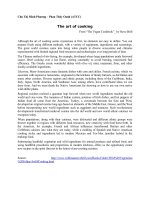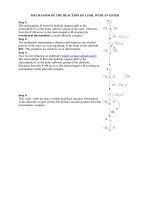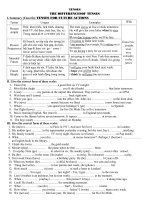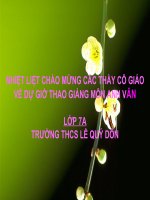The eye of dread
Bạn đang xem bản rút gọn của tài liệu. Xem và tải ngay bản đầy đủ của tài liệu tại đây (1.38 MB, 376 trang )
TheProjectGutenbergEBookofTheEyeofDread,byPayneErskine
ThiseBookisfortheuseofanyoneanywhereatnocostandwith
almostnorestrictionswhatsoever.Youmaycopyit,giveitawayor
re-useitunderthetermsoftheProjectGutenbergLicenseincluded
withthiseBookoronlineatwww.gutenberg.net
Title:TheEyeofDread
Author:PayneErskine
Illustrator:GeorgeGibbs
ReleaseDate:September19,2009[EBook#30031]
Language:English
***STARTOFTHISPROJECTGUTENBERGEBOOKTHEEYEOFDREAD***
ProducedbyRogerFrankandtheOnlineDistributed
ProofreadingTeamat
“Listen.Gowiththeloveinyourheart––forme.”
FRONTISPIECE.SeePage329.
TheEyeofDread
ByPAYNEERSKINE
Authorof“TheMountainGirl,”“JoyfulHeatherby,”
Etc.
emblem
WithFrontispieceby
GEORGEGIBBS
A.L.BURTCOMPANY,PUBLISHERS
114-120EastTwenty-thirdStreet--NewYork
PUBLISHEDBYARRANGEMENTWITHLITTLE,BROWN&COMPANY
Copyright,1913,
BYLITTLE,BROWN,ANDCOMPANY.
Allrightsreserved
Published,October,1913
Reprinted,October,1913
CONTENTS
BOOKONE
CHAPTER
I.
II.
III.
IV.
V.
VI.
VII.
VIII.
IX.
X.
XI.
XII.
XIII.
PAGE
BETTY
WATCHINGTHEBEES
AMOTHER’SSTRUGGLE
LEAVE-TAKING
THEPASSINGOFTIME
THEENDOFTHEWAR
ANEWERABEGINS
MARYBALLARD’SDISCOVERY
THEBANKER’SPOINTOFVIEW
THENUTTINGPARTY
BETTYBALLARD’SAWAKENING
MYSTERIOUSFINDINGS
CONFESSION
1
9
23
34
49
59
69
87
97
110
125
139
157
BOOKTWO
XIV.
XV.
XVI.
XVII.
XVIII.
XIX.
XX.
XXI.
XXII.
XXIII.
XXIV.
OUTOFTHEDESERT
THEBIGMAN’SRETURN
APECULIARPOSITION
ADOPTINGAFAMILY
LARRYKILDENE’SSTORY
THEMINE––ANDTHEDEPARTURE
ALONEONTHEMOUNTAIN
THEVIOLIN
THEBEASTONTHETRAIL
ADISCOURSEONLYING
AMALIA’SFÊTE
168
183
198
208
219
237
252
267
282
295
305
XXV.
HARRYKINGLEAVESTHEMOUNTAIN
318
BOOKTHREE
XXVI.
XXVII.
XXVIII.
XXIX.
XXX.
XXXI.
XXXII.
XXXIII.
XXXIV.
XXXV.
XXXVI.
XXXVII.
XXXVIII.
XXXIX.
XL.
THELITTLESCHOOL-TEACHER
THESWEDE’STELEGRAM
“ARESEMBLANCESOMEWHERE”
THEARREST
THEARGUMENT
ROBERTKATER’SSUCCESS
THEPRISONER
HESTERCRAIGMILERECEIVESHERLETTER
JEANCRAIGMILE’SRETURN
THETRIAL
NELSNELSON’STESTIMONY
THESTRANGER’SARRIVAL
BETTYBALLARD’STESTIMONY
RECONCILIATION
THESAMEBOY
331
342
354
365
376
387
408
422
433
445
453
463
475
487
499
THEEYEOFDREAD
BOOKONE
CHAPTERI
BETTY
Two whip-poor-wills were uttering their insistent note, hidden somewhere
amongthethickfoliageofthemapleandbasswoodtreesthattoweredabovethe
springdownbehindthehousewheretheBallardslived.Theskyintheweststill
glowedwithamberlight,andthecrescentmoonfloatedlikeagoldenboatabove
thehorizon’sedge.Thedayhadbeenunusuallywarm,andthefamilywereall
gatheredonthe frontporch inthedusk.Thelampswithinwereunlighted, and
theeveningwindblewthewhitemuslincurtainsoutandinthroughtheopened
windows.Theporchwaslow,––onlyastepfromtheground,––andthegrassof
thedooryardfeltsoftandcooltothebarefeetofthechildren.
Infrontandallaroundlaythegarden––flowersandfruitquaintlyintermingled.
Downthelongpathtothegate,wherethreeroadsmet,greatbunchesofpeonies
lifted white blossoms––luminously white in the moonlight; and on either side
rowsofcurrantbushescastlow,darkshadows,andhereandtheredwarfcrab2
appletreestossedpale,scentedflowersabovethem.Intheduskyeveninglight
theirisflowersshowedfrailandiridescentagainstthedarkshadowsunderthe
bushes.
Thechildrenchatteredquietlyattheirplay,asiftheyfeltamysteryaroundthem,
and small Betty was sure she saw fairies dancing on the iris flowers when the
light breeze stirred them; but of this she said nothing, lest her practical older
sister should drop a scornful word of unbelief, a thing Betty shrank from and
instinctively avoided. Why should she be told there were no such things as
fairies and goblins and pigwidgeons, when one might be at that very moment
dancingatherelbowandhearitall?
SoBettywaggedhercurlygoldenhead,wisewiththewisdomofchildhood,and
wentherownwaysandthoughtherownthoughts.Asforthestrangecreatures
of wondrous power that peopled the earth, and the sky, and the streams, she
knew they were there. She could almost see them, could almost feel them and
hearthem,eventhoughtheywerehiddenfrommortalsight.
Did shenotoften gowhenthesunwassetting andclimbthefence behind the
barnunderthegreatlocustandsilver-leafpoplartrees,wherenonecouldseeher,
andwatchthefierygriffinsinthewest?Couldshenotseethemflameandflash,
their wings spreading far out across the sky in fantastic flight, or drawn close
andfoldedaboutthem inhuesof purpleandcrimsonandgold? Couldshenot
seetheflyingmist-womenflingingtheirfloatingrobesofsoftestpinkandpalest
green around their slender limbs, and trailing them delicately across the
deepeningsky?
Hadshenotheardthegiants––nay,seenthem––drivingtheirterriblesteedsover
thetumbledclouds,androllingthemsmoothwithnoiseofthunder,underhuge
rollingmachinesathousandtimesbiggerthanthatFarmerHopkinsusedtocrush
the clods in his wheat field in the spring? Had she not seen the flashes of fire
dartthroughtheheavens,struckbythehoofsofthegiants’hugebeasts?Ah!She
knew!IfMarthawouldonlylistentoher,shecouldshowhersomeofthesetrue
thingsandstopherscoffing.
Lured by these mysteries, Betty made short excursions into the garden away
from the others, peering among the shadows, and gazing wide-eyed into the
clusters of iris flowers above which night moths fluttered softly and silently.
Maybetherewerefairiesthere.Threecouldrideatonceonthebackofadevil’s
ridinghorse,sheknew,andinthedaytimetheyrodethedragonflies,twoata
time; they were so light it was nothing for the great green and gold, big-eyed
dragonfliestocarrytwo.
Bettyknewaplacebelowthespringwherethemaidenhairferngrewthickand
spread out wide, perfect fronds on slender brown stems, shading fairy bowers;
andwheretallerfernsgrewhighandleanedoverlikeadelicatefairyforest;and
wherethewildvioletsgrewsothickyoucouldnotseethegroundbeneaththem,
andthegrasswaslushandlonglikefinegreenhair,andcreptupthehillsideand
overtherootsofthemapleandbasswoodtrees.Herelivedtheelves;sheknew
themwell,andoftenlaywithherheadamongtheviolets,listeningforthethin
sound of their elfin fiddles. Often she had drowsed the summer noon in the
coolness, unheeding the dinner call, until busy Martha roused her with the
sisterlyscoldingsheknewshedeservedandtookingoodpart.
Now as Betty crept cautiously about, peering and hoping with a half-fearing
expectation,asweet,threadlikewailtrembledouttowardheracrossthemoonlit
andshadowedspace.Herfatherwastuninghisviolin.Hermothersatathisside,
hushing Bobby in her arms. Betty could hear the sound of her rockers on the
porchfloor.Nowtheplaintivecalloftheviolincamestronger,andshehastened
backtocurlupatherfather’sfeetandlisten.Sheclosedhervision-seeingeyes
and leaned against her father’s knee. He felt the gentle pressure of his little
daughter’sheadandlikedit.
All the long summer day Betty’s small feet had carried her on numberless
errandsforyoungandold,andastheseasonadvancedshewouldbebusierstill.
This Betty well knew, for she was old enough to remember other summers,
several of them, each bringing an advancing crescendo of work. But oh, the
happydays!ForBettylivedinaworldallherown,whereinherplaywasasreal
asherwork,andlaborwasturnedbyherimaginativelittlemindintonewforms
ofplay,andalthoughnightoftenfoundherweary––tootiredtoliequietlyinher
bed sometimes––the line between the two was never in her thoughts distinctly
drawn.
To-night Betty’s conscience was troubling her a little, for she had done two
naughtythings,andthepatheticqualityofherfather’smusicmadeherwishwith
alltheintensityofhersensitivesoulthatshemightconfesstosomeonewhatshe
haddone,butitwasalltoopeacefulandsweetnowtotellhermotherofnaughty
things,and,anyway,shecouldnotconfessbeforethewholefamily,soshetried
torepentveryhardandtellGodallaboutit.Somehowitwasalwayseasierto
tell God about things; for she reasoned, if God was everywhere and knew
everything,thenheknewshehadbeenbad,andhadseenherallthetime,andall
sheneeddowastoownuptoit,withoutexplainingeverythinginwords,asshe
wouldhavetodotohermother.
Brother Bobby’s bare feet swung close to her cheek as they dangled from her
mother’sknee,andsheturnedandkissedthem,firstoneandthentheother,with
eagerkisses.Hestirredandkickedoutatherfretfully.
“Don’twakehim,dear,”saidhermother.
ThenBettydrewupherkneesandclaspedthemaboutwithherarms,andhidher
faceonthemwhilesherepentedveryhard.Motherhadsaidthatverydaythat
sheneverfelttroubledaboutthebabywhenBettyhadcareofhim,andthatvery
dayshehadrecklesslytakenhimupintothebarnloft,climbingbehindhimand
guiding his little feet from one rung of the perpendicular ladder to another,
teachinghimtoclingwithclenchedhandstotheroundsuntilshehadlandedhim
intheloft.Thereshehadpersuadedhimhewasaswallowinhisnest,whileshe
hadtakenherfillofthedelightofleapingfromtheloftdownintothebay,where
shehadfirsttossedenoughhaytomakeasoftlightingplaceforthetwelve-foot
leap.
Oh, the joy of it––flying through the air! If she could only fly up instead of
down!Everytimesheclimbedbackintotheloftshewouldstopandcuddlethe
littlebrotherandtosshayoverhimandtellhimhewasababybird,andshewas
the mother bird, and must fly away and bring him nice worms. She bade him
lookuptotheraftersaboveandseethemotherbirdsflyingoutandin,whilethe
littlebirdsjustsatstillintheirnestsandopenedtheirmouths.SoBobbysatstill,
andwhenshereturned,obedientlyopenedhismouth;butalas!heweariedofhis
rôle in the play, and at last crept to the very edge of the loft at a place where
therewasnohayspreadbeneathtobreakhisfall;andwhenBettylookedupand
saw his sweet baby face peering down at her over the edge, her heart stopped
beating. How wildly she called for him to wait for her to come to him! She
promisedhimallthedearestofhertreasuresifhewouldwaituntil“sister”got
there.
Now,asshesatclaspingherknees,herlittlebodygrewalltremblingandweak
again as she lived over the terrible moment when she had reached him just in
time to drag him back from the edge, and to cuddle and caress him, until he
lifteduphisvoiceandwept,notbecausehewasintheleasttroubledorhurt,but
becauseitseemedtobetherightthingtodo.
Then she gave him the pretty round comb that held back her hair, and he
promptlystraighteneditandbrokeit;andwhenshereluctantlybroughthimback
to dinner––how she had succeeded in getting him down from the loft would
makeachapterofdiplomacy––hermotherreprovedherforallowinghimtotake
it,andlappedthetwopiecesandwoundthemaboutwiththread,andtoldhershe
mustwearthebrokencombafterthis.Shewasglad––gladitwasbroken––and
she had treasured it so––and glad that her mother had scolded her; she wished
she had scolded harder instead of speaking words of praise that cut her to the
heart.Oh,oh,oh!Ifhehadfallenover,hewouldbedeadnow,andshewould
havekilledhim!Thusshetorturedherself,andrepentedveryhard.
Theothersinshehadthatdaycommittedshefelttobeadoublesin,becauseshe
knewallthetimeitwaswronganddiditdeliberately.Whenshewentoutwith
thecornmealtofeedthelittlechicksandfetchinthenew-laideggs,shecarried,
concealed under her skirt, a small, squat book of Robert Burns’ poems. These
poemssheloved;notthatsheunderstoodthem,butthattherhythmpleasedher,
andtheoddwordsandhalf-comprehendedphrasesstirredherimagination.
So, after feeding the chicks and gathering the eggs, she did not return to the
house, but climbed instead up into the top of the silver-leaf poplar behind the
barn,andsattherelong,swayingwiththeswayingtreetopandreadingthelines
that most fascinated her and stirred her soul, until she forgot she must help
Martha with the breakfast dishes––forgot she must carry milk to the
neighbor’s––forgotshemustmindthebabyandpeelthepotatoesfordinner.It
wassodelightfultoswayandswingandchanttherythmiclinesoverandover
that almost she forgot she was being bad, and Martha had done the things she
oughttohavedone,andthebabycriedhimselftosleepwithouther,andlaywith
thepathetictearmarksstillonhischeeks,buthertiredmotherhadonlylooked
reproachfullyatherandhadnotsaidoneword.Oh,dear!Ifshecouldonlybea
goodgirl!Ifonlyshemightpassonedaybeinggoodalldaylongwithnothingto
regret!
Nowwiththewailingoftheviolinhersoulgrewhungryandsad,andastrange,
unchildishfearcreptoverher,afearoftheyearstocome––solongandendless
they would be, always coming, coming, one after another; and here she was,
nevertostopliving,andeverydaydoingsomethingthatsheoughtnotandevery
eveningrepentingit––andherfathermightstoplovingher,andhersistermight
stop loving her, and her little brother might stop loving her, and Bobby might
die––andevenhermothermightdieorstoplovingher,andshemightgrowup
andmarryamanwhoforgot afterawhiletoloveher––andshemightbevery
poor––evenpoorerthantheywerenow,andhavetowashdisheseverydayand
noonetohelpher––untilatlastshecouldbearthesadnessnolonger,andcould
notrepentashardassheought,therewhereshecouldnotgodownonherknees
andjustcryandcry.Sosheslippedawayandcreptinthedarknesstoherown
room,wherehermotherfoundherhalfanhourlateronherkneesbesidethebed
fastasleep.Shelovinglyundressedthelimp,wearylittlegirl,liftedhertenderly
andlaidhercurlyheadonthepillow,andkissedhercheekwitharepentantsigh
ofherown,regrettingthatshemustlaysomanytasksonsosmallachild.
CHAPTERII
WATCHINGTHEBEES
FatherBallardwalkedslowlyupthepathfromthegarden,wipinghisbrow,for
theheatwasoppressive.“Mary,mydear,Iseesignsofswarming.Thebeesare
hangingoutonthathiveundertheTolmanSweet.Where’sBetty?”
“She’sdowncellarchurning,butshecanleave.Bobby’sgettingfretful,anyway,
andshecantakehimunderthetreesandwatchthebeesandamusehim.Betty!”
Mary Ballard went to the short flight of steps leading to the paved basement,
dark and cool: “Betty, father wants you to watch the bees, dear. Find Bobby.
He’s so still I’m afraid he’s out at the currant bushes again, and he’ll make
himself sick. Keep an eye on the hive under the Tolman Sweet particularly,
dear.”
Gladly Betty bounded up the steps and darted away to find the baby who was
still called the baby by reason of his being the last arrival, although he was
nearly three, and an active little tyrant at that. Watching the bees was Betty’s
delight.Mindingthebaby,lollingunderthetreesreadingherbooks,gazingup
into the great branches, and all the time keeping an eye on the hives scattered
aboutinthegarden,––nothingcouldbepleasanter.
Naturally Betty could not understand all she read in the books she carried out
10
from the library, for purely children’s books were very few in those days. The
children of the present day would be dismayed were they asked to read what
Betty pondered over with avidity and loved. Her father’s library was his one
extravagance, even though the purchase of books was always a serious matter,
each volume being discussed and debated about, and only obtained after due
preparationbysundrysmalleconomies.
Asforworldlypossessions,theBallardshadstartedoutwithnothingatallbut
their own two hands, and, as assets, well-equipped brains, their love for each
other, a fair amount of thrift, and a large share of what Mary Ballard’s old
Grannie Sherman used to designate as “gumption.” Exactly what she intended
shouldbeunderstoodbytheworditwouldbehardtosay,unlessitmightbethe
faculty with which, when one thing proved to be no longer feasible as a shift
towardprogressandthemakingofalivingforanincreasingfamily,theywere
enabledtodiscoverothermeansandworkthemouttoaproductiveconclusion.
Thus,whentimesgrewhardunderthestressoftheCivilWar,andtheworksof
artrepresentingmanyhoursofBertrandBallard’skeenesteffortlayinhisstudio
unpurchased, and even carefully created portraits, ordered and painstakingly
painted,wereleftonhishands,unclaimedandunpaidfor,hequietlyturnedhis
attentiontohisgarden,saying,“Peoplecanlivewithoutpictures,buttheymust
eat.”
So he obtained a few of the choicest of the quickly produced small fruits and
vegetablesandflowers,andsoonhadrareandbeautifulthingstosell.Hisclever
hands, which before had made his own stretchers for his canvases, and had
fashionedandgildedwithgoldleaftheframesforhisownpaintings,nowmade
trellises for his vines and boxes for his fruits, and when the price of sugar
climbedtotheverytopofthegamut,hecreatedbeehivesonnewmodels,and
boughtabookonbeeculture;erelonghehadcombsofdelicioushoneytotempt
theloversofsweets.
But how came Bertrand Ballard away out in Wisconsin in a country home,
paintingpicturesforpeoplewhoknewlittleornothingofart,andcarednotto
know more, raising fruits and keeping bees for the means to live? Ah, that is
another story,and to tell it wouldmakeanother book; suffice ittosaythatfor
love of a beautiful woman, strong and wise and sweet, he had followed her
farmerfatheroutintothenewerwestfromoldNewYorkState.
There,frailinhealthanddelicateandchoiceinhistastes,butbraveinspirit,he
tookupthebattleoftheweakwithlife,andfoughtitlikeastrongman,valiantly
andwell.Andwheregothehisstrength?Howaretheweakevermadestrong?
Through strength of love––the inward fire that makes great the soul, while
consumingthedrossoffalsevaluesandfoolishestimates––fromthemerryheart
that could laugh through any failure, and most of all from the beautiful hand,
suppleandworkful,andgentleandforceful,thatlayinhis.
But this is not the story of Bertrand Ballard, except incidentally as he and his
family playtheir part inthedrama thatcentersinthelivesoftwolads, oneof
whom––Peter Craigmile, Junior––comes now swinging up the path from the
frontgate,wherethreeroadsmeet,braveinhisnewuniformofblue,withlifted
head,andeyesgraveandshiningwithakindofsolemnelation.
“Bertrand, here comes Peter Junior in a new uniform,” Mary Ballard called to
herhusband,whowasworkingataboxinwhichhemeanttofitglasssidesfor
anaquariumfortheedificationofthelittleones.Hecamequicklyoutfromhis
workroom, and Mary rose from her seat and pushed her mending basket one
side,andtogethertheywalkeddownthepathtomeettheyouth.
“PeterJunior,haveyoudoneit?Oh,I’msorry!”
“Why, Mary! why, Mary! I’m astonished! Not sorry?” Bertrand took the boy’s
handinbothhisownandlookedupinhiseyes,fortheladwastall,muchtaller
thanhisfriend.“IwouldgomyselfifIonlyhadthestrengthandwerenotnearsighted.”
“ThanktheLord!”saidhiswife,fervently.
“Why,Mary––Mary––I’mastonished!”hesaidagain.“Ourcountry––”
“Yes,‘OurCountry’isbeingbledtodeath,”shesaid,takingtheboy’shandin
hersforamoment;and,turning,theywalkedbacktothehousewiththeyoung
volunteer between them. “No, I’m not reconciled to having our young men go
downthereanddiebythethousandsfromdiseaseandbulletsandinprisons.It’s
wrong!Isaywarisiniquitous,andtheissues,NorthorSouth,arenotworthit.
Peter,Ihadhopedyouweretooyoung.Whydidyou?”
“I couldn’t help it, Mrs. Ballard. The call for fifty thousand more came, and
fathergavehisconsent;and,anyway,theyaretakingayoungersetnowthanat
first.”
“Yes,andsoonthey’lltakeanolderset,andthenthey’lltakethesmallandfrail
andnear-sightedones,andthen––”Shestoppedsuddenly,withacontriteglance
at her husband’s face. He hated to be small and frail and near-sighted. She
stepped round to his side and put her hand in his. “I’m thankful you are,
Bertrand,”shesaidquietly.“You’llstaytoteawithus,won’tyou,Peter?We’ll
haveitoutofdoors.”
“Yes,I’llstay––thankyou.Itmaybethelasttime,andmother––Icametoseeif
you’dgouphomeandseemother,Mrs.Ballard.Ikindofthoughtyou’dthinkas
father and Mr. Ballard do about it, and I thought you might be able to help
mothertoseeitthatway,too.Yousee,mother––she––Ialwaysthoughtyouwere
kindofstrongandwouldseethingssortof––well––big,youknow,more––aswe
mendo.”Heheldhisheadhighandlookedoffashespoke.
Sheexchangedahalf-smilingglancewithherhusband,andtheirhandsclasped
tighter. “Maybe, though––if you feel this way––you can’t help mother––but
whatshallIdo?”Thebigboylookedwistfullydownather.
“Imaynotbeabletohelphertoseethingsyouwant,PeterJunior.Maybeshe
wouldbehappierinseeingthingsherownway;butIcansympathizewithher.
Perhaps I can help her to hope for the best, and anyway––we can––just talk it
over.”
“Thankyou,Mrs.Ballard,thankyou.Idon’tcarehowsheseesit,if––if––she’ll
only be happier––and––give her consent. I can’t bear to go away without that;
butifshewon’tgiveit,Imustgoanyway,––youknow.”
“Yes,”shesaid,smiling,“Isupposewewomenhavetobeforcedsometimes,or
weneverwouldallowsomethingstobedone.Youenlistedfirstandthenwent
to her for her consent? Yes, you are a man, Peter Junior. But I tell you, if you
were my son, I would never give my consent––nor have it forced from me––
still––Iwouldloveyoubetterfordoingthis.”
“My love, your inconsistency is my joy,” said her husband, as she passed into
thehouseandleftthemtogether.
Thesunstillshonehotlydown,buttheshadowsweregrowinglonger,andBetty
left baby asleep under the Harvest apple tree where she had been staying
patientlyduringthelong,warmhours,andsatatherfather’sfeetontheedgeof
theporch,whereapparentlyshewaswhollyoccupiedintracingpatternswithher
baretoesinthesandofthepath.NowandthensheranouttotheHarvestapple
tree and back, her golden head darting among the green shrubbery like a
sunbeam. She wished to do her full duty by the bees and the baby, and at the
same time hear all the talk of the older ones, and watch the fascinating young
soldierinhisnewuniform.
Asbrightasthesunbeam,andassilent,shewatchedandlistened.Herheartbeat
fastwithexcitement,asitoftendidthesedays,whensheheardthemtalkofthe
warandthemenwhowentaway,perhapsnevertoreturn,ortoreturnwithgreat
glory. Now here was Peter Junior going. He already had his beautiful new
uniform, and he would march and drill and carry a gun, and halt and present
arms,alongwiththeoldermenshehadseeninthegreatcampoutonthehigh
bluffswhichoverlookedthewide,sweeping,rushing,willfulWisconsinRiver.
Oh,ifshewereonlyamanandasoldasPeterJunior,shewouldgowithhim;
butitwasverygrandtoknowhimeven.Whywassheagirl?IfGodhadonly
asked her which she would rather be when he had made her out of dust, she
would have told him to make her a man, so she might be a soldier. It was not
fair. There was Bobby; he would be a man some day, and he could ride on a
largeblackhorseliketheknightsofold,andgotowars,andrescuepeople,and
do deeds of arms. What deeds of arms were, she little knew, but it was
somethingverystrongandwonderfulthatonlyknightsandsoldiersdid.
Bettyheavedadeepsigh,andputoutherhandandsoftlytouchedPeterJunior’s
trousers.Hethoughtitwasthekittenpurringabout.No,Godhadnottreatedher
fairly.Nowshemustgrowupandbeonlyawoman,andwashdishes,andsweep
anddust,andgetverytired,andweardresses––andoh,dear!Butthenperhaps
God had to do that way, for if he had given everybody a choice, everybody
wouldchoosetobemen,andtherewouldbenowomentomindthehomeand
takecareofthelittlechildren,anditwouldbeaverysadkindofworld,asshe
hadoftenheardherfathersay.PerhapsGodhadtodowiththemasPeterJunior
had done with his mother when he enlisted first and asked her consent
afterwards;justmakethemgirls,andthentrytoconvincethemafterwardsthatit
wasafinethingtobeagirl.ShewishedshewereBobbyinsteadofBetty––but
then––Bobbymightnothavelikedthat.
Sheglancedwistfullyatthesleepingchildandsawhimtosshisarmsabout,and
knew she ought to be there to sway a green branch over him to keep the little
gnatsandfliesfrombotheringhimandwakinghim;andthebeesmightswarm
andnooneseethem.
“Father,isitthreeo’clockyet?”
“Yes,deary,why?”
“Goody! The bees won’t swarm now, will they? Will you bring Bobby in,
father?”
“Heisverywellthere;wewon’tdisturbhim.”
Peter Junior looked down on the little girl, so full of vitality and life and
inspiration, so vibrant with enthusiasm, and saw her vaguely as a slightly
disturbingelement,butotherwiseoflittlemomentintheworld’seconomy.His
thoughtswereongreaterthings.
Betty accepted her father’s decision without protest, as she accepted most
things,––afinalitytobeenduredandmadethebestof,––soshecontinuedtorun
back and forth between the sleeping child and the porch, thereby losing much
interestingdialogue,––allaboutcampsandfightingandscoutduty,––untilatlast
hermotherreturnedandwithaglanceathersmalldaughter’sfacesaid:––
“Father,willyoubringbabyinnowandputhiminhiscradle?Bettyhashadhim
nearlyallday.”Andfatherwent.Oh,beautifulmother!Howdidsheknow!
Then Betty settled herself at Peter Junior’s feet and looked up in his eyes
gravely.“Whatwillyoube,nowyouareasoldier?”sheasked.
“Why,asoldier.”
“No,Imean,willyoubeageneral––oraflagcarrier––orwillyoudrum?I’dbea
generalifIwereyou––orelseadrummer.Ithinkyouwouldbeveryhandsome
forageneral.”
Peter Junior threw back his head and laughed. It was the first time he had
laughedthatday,andyethewasbothproudandhappy.“Wouldyouliketobea
soldier?”
“Yes.”
“Butyoumightbekilled,orhaveyourlegshotoff––or––”
“Iknow.Somightyou––butyouwouldgo,anyway––wouldn’tyou?”
“Certainly.”
“Well,thenyouunderstandhowIfeel.I’dliketobeaman,andgotowar,and
‘Haveaparttotearacatin,’too.”
“What’s that? What’s that? Mary, do you hear that?” said her father, resuming
hisseatatPeter’sside,andhearingherremark.
“Why,father,wouldn’tyou?Youknowyou’dliketogotowar.Iheardwhatyou
saidtomother,and,anyway––I’djustliketobeamanand‘Haveaparttoteara
catin,’thewaymenhave.”
BertrandBallardlookeddownandpattedhislittledaughter’shead,thencaught
her up and placed her on his knee. He realized suddenly that his child was an
entity unfathomed, separate from himself, working out her own individuality
almost without guidance, except such as he and his Mary were unconsciously
givingtoherbytheirdailyactsandwords.
“What books are those you have there? Don’t you know you mustn’t take
father’sShakespeareoutandleaveitonthegrass?”
Bettylaughed.“HowdidyouknowIhadShakespeare?”
“Didn’tyousayyou‘Wouldlikeaparttotearacatin’?”
“Oh,haveyouread‘MidsummerNight’sDream’?”Sheliftedherheadfromhis
bosomandeyedhimgravelyamoment,thensnuggledcomfortablydownagain.
“But then, I suppose you have read everything.” Her father and Peter both
laughed.
“Wereyoureading‘MidsummerNight’sDream’outthere?”
18
“No, I’ve read that lots of times––long ago. I’m reading ‘The Merry Wives of
Windsor’now.”
“Mary,Mary,doyouhearthis?Ithinkit’stimeourBettyhadalittlesupervision
inherreading.”
MaryBallardcametothedoorfromtheteatablewhereshehadbeenarranging
herlittlesetofdelicatechina,heroneraretreasureandinheritance.“Yes,Iknew
shewasreading––whatevershefancied,butIthoughtIwouldn’tinterfere––not
yet.Ihavesolittletime,foronething,and,anyway,Ithoughtshemightbrowse
abit.She’slikeacalfinrarepastures,andIdon’tthinksheunderstandsenough
todoherharm––ormuchgood,either.Thosethingsslideofffromherlikewater
offaduck’sback.”
Betty looked anxiously up at her mother. What things was she missing? She
mustreadthemalloveragain.
“Whatelsehaveyououtthere,Betty?”askedherfather.
Bettydroppedherheadshamefacedly.Sheneverknewwhenshewasintheright
and when wrong. Sometimes the very things which seemed most right to her
weremostwrong.“That’s‘ParadiseLost.’Itwasanoldbook,father.Therewas
atearinthebackwhenItookitdown.IliketoreadaboutSatan.Iliketoread
aboutthemightyhostsandtheangelsandtheburninglake.Isthathell?Iwas
pretendingifthebeesswarmedthattheywouldbethemightyhostofbadangels
fallingoutofheaven.”
AgainPeterflungbackhisheadandlaughed.Helookedatthechildwithnew
interest,butBettydidnotsmilebackathim.Shedidnotlikebeinglaughedat.
19
“It’strue,”shesaid;“theydidfalloutofheaveninaswarm,anditwaslikeover
atHighKnobontheriverbank,onlyamilliontimeshigher,becausetheywere
solongfalling.‘Frommorntillnoontheyfell,fromnoontilldewyeve.’”Betty
lookedoffintospacewithhalf-closedeyes.Shewasseeingthemfall.“Itwasa
long time to be in suspense, wasn’t it, father?” Then every one laughed. Even
motherjoinedin.Shewasputtingthelasttouchestotheteatable.
“Mary, my dear, I think we’d better take a little supervision of the child’s
reading––Ido,really.”
Thegateattheendofthelongpathtothehouseclicked,andanotherladcame
swingingupthewalk,slightlytallerthanPeterJunior,butotherwiseenoughlike
him in appearance to be his own brother. He was not as grave as Peter, but
smiledashehailedthem,wavinghiscapabovehishead.Healsoworetheblue
uniform,anditwasnew.
“Hallo,Peter!Youhere?”
“OfcourseI’mhere.Ithoughtyouwerenevercoming.”
“Youdid?”
Bettysprangfromherfather’slapandrantomeethim.Sheslippedherhandin
hisandhoppedalongathisside.“Oh,Rich!Areyougoing,too?IwishIwere
you.”
Heliftedthechildtoalevelwithhisfaceandkissedher,thensetheronherfeet
again.“Neverwishthat,Betty.Itwouldspoilanicelittlegirl.”
“I’m not such a nice little girl. I––I––love Satan––and they’re going to––to––
supervisemyreading.”Sheclungtohishandandnoddedherheadwithfinality.
Heswungheralong,makinghertakelongleapsastheywalked.
“YouloveSatan?Ithoughtyoulovedme!”
“It’sthesamething,Rich,”saidPeterJunior,withagrin.
Bertrandhadgonetothekitchendoor.“Mary,mylove,here’sRichardKildene.”
Sheenteredthelivingroom,carryingaplateoflight,hotbiscuit,andhurriedout
toRichard,greetinghimwarmly––evenlovingly.
“Bertrand, won’t you and the boys carry the table out to the garden?” she
suggested. “Open both doors and take it carefully. It will be pleasanter here in
theshade.”
The young men sprang to do her bidding, and the small table was borne out
under the trees, the lads enumerating with joy the articles of Mary Ballard’s
simplemenu.
“Hotbiscuitsandhoney!Mygolly!Won’twewishforthisinabouttwomonths
fromnow?”saidRichard.
“Creamandcarawaycookies!”shoutedPeterJunior,turningbacktotheporchto
helpBertrandcarrythechairs.“Ofcoursewe’llbewishingforthisbeforelong,
butthat’spartofsoldiering.”
“We’renotlookingforwardtoawell-fed,easytimeofit,sowe’lljustmakethe
bestofthisto-night,andeateverythinginsight,”saidRichard.
Bertrandpreferredtochangethesubject.“Thisissomeofournewwhiteclover
honey,” he said. “I took it from that hive over there last evening, and they’ve
beenworkingalldayasiftheyhadhadnewlifegiventhem.Allbeeswantisa
lotofemptyspaceforstoringhoney.”
RichardfollowedMrs.Ballardintothekitchenforthetea.“Wherearetheother
children?”heasked.
“MarthaandJamiearespendingaweekwithmymotherandfather.Theyloveto
go there, and mother––and father, also, seem never to have enough of them.
Baby is still asleep, and I must waken him, too, or he won’t sleep to-night. I
hungapailofmilkoverthespringtokeepitcool,andthebutteristherealso––
andtheDutchcheeseinatinbox.Canyou––wait,I’dbettergowithyou.We’ll
leavetheteatosteepaminute.”
They passed through the house and down toward the spring house under the
mapleandbasswoodtreesattheback,walkingbetweenrowsofcurrantbushes
wherethefruithungred.
“Ihatetoleaveallthis––maybeforever,”saidtheboy.Thecornersofhismouth
droopedalittle,andhelookeddownatMaryBallardwithatenderglintinhis
deep blue eyes.Hiseyeswere asblueasthelakeona summer’s evening,and
theywereshadedbyheavydarkbrownlashes,almostblack.Hisbrowsandhair
werethesamedeepbrown.PeterJunior’swereashadelighter,andhishairmore
curling.Itwasoftenamatterofdiscussioninthevillageastowhichoftheboys
wasthehandsomer.Thattheywerebothfine-lookingladswasalwaysconceded.
Mary Ballard turned toward him impulsively. “Why did you do this, Richard?
Why?Ican’tfeelthatthisfeverforwarisright.Itisterrible.Wearelosingthe
bestbloodinthelandinawickedwar.”Shetookhistwohandsinhers,andher
eyesfilled.“Whenwefirstcamehere,yourmotherwasmydearestfriend.You
never knew her, but I loved her––and her loss was much to me. Richard, why
didn’tyouconsultus?”
“Ihadn’tanyonebutyouandyourhusbandtocare.Oh,AuntHesterlovesme,
ofcourse,andisawfullygoodtome––buttheElder––Ialwaysfeelsomehowas
ifheexpectsmetogotothebad.Heneverhadanyuseformyfather,Iguess.
Wasmyfather––was––henogood?Don’tmindtellingmethetruth:Ioughtto
know.”
“Yourfatherwasnotsowellknownhere,buthewas,inBertrand’sestimation,a
royal Irish gentleman. We both liked him; no one could help it. Never think
hardlyofhim.”
“Whyhashenevercaredforme?WhyhaveIneverknownhim?”
“There was a quarrel––or––some unpleasantness between your uncle and him;
it’sanoldthing.”
Richard’s lip quivered an instant, then he drew himself up and smiled on her,
thenhestoopedandkissedher.“Someofusmustgo;wecan’tletthisnationbe
broken up. Some men must give their lives for it; and I’m one of those who
oughttogo,forIhavenoonetomournforme.Halftheclasshasenlisted.”
“Iventuretosayyousuggestedit,too?”
“Well––yes.”
“AndPeterJuniorwasthefirsttofollowyou?”
“Well,yes!I’msorry––becauseofAuntHester––butwealwaysdopulltogether,
you know. See here, let’s not think of it in this way. There are other ways.
PerhapsI’llcomebackwithstrapsonmyshouldersandmarryBettysomeday.”
“God grant you may; that is, if you come back as you left us. You understand
me?Thesameboy?”
“IdoandIwill,”hesaidgravely.
That was a happy hour they spent at the evening meal, and many an evening
afterwards,whenhardshipandwearinesshadmadetheladsseemmorerugged
andyearsolder,theyspokeofitandliveditover.
CHAPTERIII
AMOTHER’SSTRUGGLE
“Come, Lady, come. You’re slow this morning.” Mary Ballard drove a steady,
well-bred, chestnut mare with whom she was on most friendly terms. Usually
her carryall was filled with children, for she kept no help, and when she went
abroad,shemustperforcetakethechildrenwithherorspendanunquiethouror
twowhileleavingthembehind.Thismorningshehadleftthechildrenathome,
and carried in their stead a basket of fruit and flowers on the seat beside her.
“Come,Lady,come;justhurryalittle.”Shetouchedthemarewiththewhip,a
delicateremindertohaste,whichLadyassumedtobeaflyandtreatedassuch
withaswitchofhertail.
ThewayseemedlongtoMaryBallardthismorning,andthesunbeatingdown
ontheparchedfieldsmadetheairquiverwithheat.Theunpavedroadwasheavy
withdust,andthemareseemedtodragherfeetthroughitunnecessarilyasshe
jogged along. Mary was anxious and dreaded the visit she must make. She
wouldbegladwhenitwasover.Whatcouldshesaytothestrickenwomanwho
spenthertimebehindclosedblinds?Presentlysheleftthedustbehindanddrove
along under the maple trees that lined the village street, over cool roads that
werekeptwellsprinkled.
24
TheCraigmileslivedonthemainstreetofthetowninthemostdignifiedofthe
well-built homes of cream-colored brick, with a wide front stoop and white
columnsattheentrance.Marywasshownintotheparlorbyaneatservingmaid,
whosteppedsoftlyasifshewereafraidofwakingsomeone.Theroomwasdark
and cool, but the air seemed heavy with a lingering musky odor. The dark
furniture was set stiffly back against the walls, the floor was covered with a
velvetcarpetofrich,darkcolors,andoilportraitswerehungaboutinheavygold
frames.
Marylookedupattwooftheseportraitswithpride,andrebelledthatthelight
wassoshutoutthattheymustalwaysbeseenintheobscurity,forBertrandhad
paintedthem,andsheconsideredthemherhusband’sbestwork.Inthepainting
ofthemandthelongsittingsrequiredtheintimacybetweenthetwofamilieshad
begun. Really it had begun before that, for there were other paintings in that
home––portraits,oldandfine,whichElderCraigmile’sfatherhadbroughtover
fromScotlandwhenhecametothenewworldtoestablishanewhome.These
paintingsweretheprideofElderCraigmile’sheart,andthedelightofBertrand
Ballard’sartistsoul.
ToBertrandtheywereadiscovery––anoasisinadesert.Onedaythebankerhad
calledhimintolookatacanvasthatwasfallingtopieceswithage,inthehope
thattheartistmighthavetheskilltorestoreit.Fromthatdaytheintimacybegan,
and a warm friendship sprang up between the two families, founded on
Bertrand’s love for the old works of art, wherein the ancestors of Peter
Craigmile,Senior,lookedoutfromtheirframeswithadignityandwarmthand
gracerarelytobemetwithinthisnewwesternland.
Bertrand’sheartleapedwithjoyashegazedononeofthem,theonehehadbeen
calledontosaveifpossible.“ThismustbeagenuineReynolds.Ah!Theycould
paint,thoseoldfellows!”hecried.
“GenuineReynolds?Why,man,itis!itis!Youareatrueartist.Youknewitina
moment.” Peter Senior’s heart was immediately filled with admiration for the
youngerman.“Yes,theywereagoodfamily––theCraigmilesofAberdeen.My
father brought all the old portraits coming to him to this country to keep the
familytraditionsalive.It’sagoodthing––agoodthing!”
“Shewasabeautifulwoman,theoriginalofthatportrait.”
“Shewasagreatbeauty,indeed.HerhusbandtookhertoLondontohaveitdone
by the great painter. Ah, the Scotch lasses were fine! Look at that color! You
don’tseethathere,no?”
“OurAmericanwomenaretoopale,forthemostpart;butthenagain,yourmen
aretoored.”
“Ah! Beef and red wine! Beef and red wine! With us in Scotland it was good
oatcakes and home-brew––and the air. The air of the Scotch hills and the sea.
You don’t have such air here, I’ve often heard my father say. I’ve spent the
greater part of my life here, so it’s mostly the traditions I have––they and the
portraits.”
Thus it came about that owing to his desire to keep up the line of family
portraits, Peter Craigmile engaged the artist to paint the picture of his gentle,
sweet-facedwife.Shewaspaintedseated,alittlesononeithersideofher;and
now in the dimness she looked out from the heavy gold frame, a half smile









